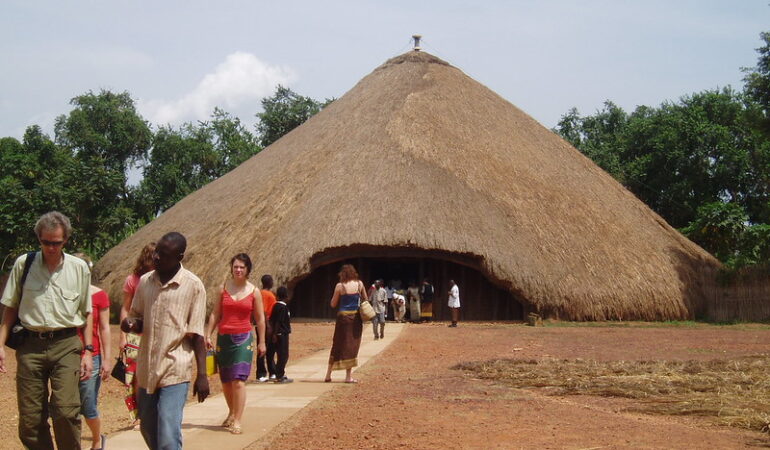
August 14, 2024
Uganda, often celebrated for its stunning landscapes and rich biodiversity, is also a land deeply rooted in cultural traditions and folklore. Among the many natural wonders that hold a special place in Ugandan culture, the country’s lakes stand out as symbols of life, spirituality, and community.
These lakes, including the vast Lake Victoria, Lake Albert, Lake Edward, and the lesser-known but culturally significant Lake Bunyonyi, have shaped the lives and traditions of the people who live near them for centuries. In this blog post, we will explore the cultural significance of Uganda’s lakes, delving into the traditions, myths, and folklore that continue to influence the lives of Ugandans today.
Spiritual Connections and Traditional Beliefs
Uganda’s lakes are not merely bodies of water; they are seen as living entities with spirits and personalities of their own. In many Ugandan cultures, lakes are believed to be inhabited by powerful spirits or gods who control the waters and the surrounding environment.
These spirits are revered and respected, and many communities have rituals and ceremonies to honor them. For example, the Baganda people, who live around Lake Victoria, believe in the spirit Mukasa, the god of the lake, who is thought to control the water’s bounty and protect fishermen from harm. Offerings and prayers are made to Mukasa to ensure safe passage and abundant fish catches.
These spiritual beliefs are often intertwined with local customs and daily life. Fishermen, before embarking on a fishing expedition, might perform rituals to appease the lake’s spirits, seeking protection from storms and other dangers. Such practices underscore the deep respect that Ugandans have for their natural environment, viewing it not only as a resource but as a sacred entity that requires reverence and care.
Folklore and Mythology
Ugandan folklore is rich with stories and legends that revolve around the country’s lakes. These tales have been passed down through generations, serving as a means of preserving cultural heritage and imparting moral lessons.
One well-known legend is the story of Lake Bunyonyi, which is known as the “Place of Many Little Birds.” According to local folklore, the lake was once a barren valley until a great flood filled it with water, creating a sanctuary for birds and a haven for the people who settled around its shores.
The lake is also associated with tales of mysterious creatures and spirits that are said to inhabit its depths, adding an air of mystique to the tranquil waters.
Another significant myth is that of Lake Kyoga, which is believed to have been formed by a giant serpent. The story goes that the serpent was angered by the actions of a greedy king and, in its wrath, created the lake as a reminder of the consequences of selfishness. Such stories are not only entertaining but also serve as cultural touchstones that reinforce the values and beliefs of the communities that tell them.
Cultural Practices and Community Life
 The lakes of Uganda play a central role in the cultural practices and community life of the people who live near them. They are often the setting for important social and cultural events, such as weddings, religious ceremonies, and community gatherings.
The lakes of Uganda play a central role in the cultural practices and community life of the people who live near them. They are often the setting for important social and cultural events, such as weddings, religious ceremonies, and community gatherings.
The lakes provide a source of livelihood for many Ugandans, with fishing being a primary occupation. The fishing communities that dot the shores of these lakes have their own unique traditions and ways of life, shaped by the rhythms of the water and the cycles of nature.
In addition to their economic importance, the lakes are also central to the artistic and creative expressions of Ugandan culture. Traditional songs, dances, and crafts often draw inspiration from the lakes and their surroundings.
For example, the iconic “Baakisimba” dance of the Baganda people celebrates the beauty and bounty of Lake Victoria, with dancers mimicking the movements of the waves and the flow of water. Similarly, local artisans create intricate carvings and paintings that depict scenes of lake life, capturing the deep connection between the people and the water.
The Role of Lakes in Modern Ugandan Culture
While the traditional significance of Uganda’s lakes remains strong, modern influences have also shaped how these water bodies are perceived and used today. The lakes are increasingly becoming popular tourist destinations, attracting visitors who are drawn to their natural beauty and cultural richness.
This growing tourism industry has brought new opportunities for cultural exchange and economic development, but it also poses challenges in terms of preserving the lakes’ cultural and environmental integrity.
Communities around the lakes are actively working to balance the demands of modern life with the preservation of their cultural heritage. This includes initiatives to promote sustainable tourism that respects local traditions and the environment.
Cultural tours, where visitors can learn about the folklore, rituals, and daily life of the lake communities, are becoming more popular, offering a way to share Uganda’s rich cultural heritage with the world while ensuring that it is preserved for future generations.
Uganda’s lakes are more than just natural landmarks; they are deeply woven into the cultural fabric of the nation. From spiritual beliefs and ancient myths to community life and modern tourism, these lakes have shaped the identity and traditions of the people who live near them.
As Uganda continues to develop and change, the cultural significance of its lakes remains a vital part of its heritage, offering a window into the past while shaping the future of the communities that depend on them. Whether through storytelling, rituals, or sustainable practices, the cultural legacy of Uganda’s lakes will continue to thrive, reflecting the enduring connection between the people and the waters that sustain them.



